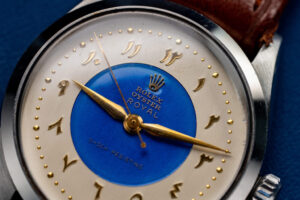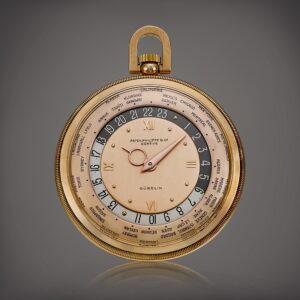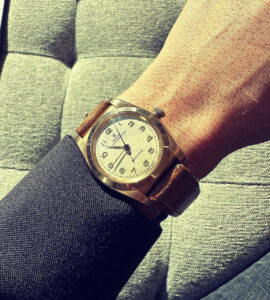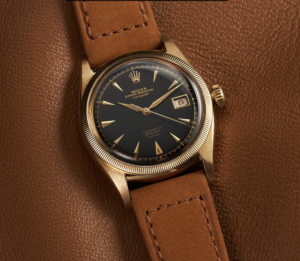In 1992 the late Queen of England gave a speech in which she said that this particular year was her annus horribillis, a year in which basically everything went wrong for her. Fast forward 30 years later, in 2022 I found my myself in a very similar situation (at least as it related to my watch collecting).
For a start the theft of my watches did not help things, but it wasn’t only the problem I had. To be frank I made one mistake after another in terms of collecting. It was mostly my own fault, partially bad luck, but in the end, I am to blame for my worst year in collecting so far. There are good years where everything seems to work, the right watches come to the market, the bidding just works in your favor and luck is on your side. Then there are bad years, where almost everything that can go wrong does go wrong. Last year I tried to buy five watches and I failed with every single one.
Here are the five big mistakes I made.
1. Think outside of the box: I like to think of myself as a bidder who is relative aggressive and doesn’t give up easily. But the large mistake I made was NOT to think outside the box. What do I mean by that?
Suppose your bidding for a relative straightforward (in terms of complication) time only Rolex watch. Like a Rolex Ref 6444 with Enamel dial, a watch I attempted to bid for (see picture below). The watch is relatively simple, except that it is not. It has an Enamel dial but also Arabic dial. I knew the estimate of the watch was too low, but instead of thinking big picture, I only thought of the low estimate that didn’t make sense to me. I figured if I paid 5- 600% above the low estimate I was certain to get the watch. Turns out that wasn’t a good strategy. A good collector doesn’t think like that.

(The beautiful Enamel dial Rolex ref 6444 with Arabic numerals/ Pic Credit: Italian Watch).
Instead, my thought process should have different. Very different.
The right way to think about this watch was, what would I pay for another time only watch, that was almost unique in terms of dial configuration, but also fresh to the market. Patek Philippe time only watches can go for CHF 300-400k (like this gorgeous Ref 96 with black sector dial) not to mention 570 or 530 time only. Even in the Rolex world a rare Ovettone like the 6098 star dial can fetch multiple hundreds of thousands. My mistake was not to compare this Ref 6444 with these kind of watches (even if an exact comparison is also flawed). Rather I got distracted by the auction estimate. I didn’t think broad enough.
I ended up bidding a very large amount but it was not enough (even if I was the underbidder). I also lost the Pink on Pink Patek world time pocket watch (605 hu) due to my narrow minded thinking. Instead of comparing it to the best pocket watches out there, I compared it to the similar pink on pink with normal dial (so not Enamel) which was a mistake.
If you want a watch that is rare you must compare it to the best available watches and remind yourself: If you don’t get that watch, when will life give you the next opportunity? Sometimes it can take years and that also has an opportunity cost.
The best collectors have a wider perspective upon which to view things. They are able to think outside the box.
2. Don’t let auction estimates distract you: Auction estimates are simply a rough guide with which to start you off with. With watches that are common – they can be useful. However, with rare watches, the kind I am usually interested in, auction estimates are mostly useless. Why so?
For a start, auction houses have various reasons to make their estimate range. It can range from attracting bidders for the lot to sometimes putting an estimate as a favour to the seller of the watch (who the auction house is essentially working for). Yes, sometimes the estimate of an auction house is an accurate estimate of the actual watch. However, let me state something very important: Good collectors make up their own estimates. It can be based on condition, rarity, beauty but also an estimate can incorporate something that has nothing to do with the watch itself. It can be simply what amount they are prepared to pay for the watch at any given time. This should incorporate the cost of not owning a watch and calculating that it may take years before another opportunity arises.
Had I completely ignored the estimate but focussed on what the watch was worth to me including the risk of not owning the watch, I would have perhaps attempted another bid on both the Patek world time as well as the blue Enamel Rolex).

(A very rare double signed Pink on Pink Patek 605 hu /Picture Credit: Sothebys).
3. Online bidding doesn’t always work: I buy most of my watches at auctions via online bidding. Bidding online has tremendous advantages: It is completely anonymous, you can decide when to bid or not (without pressure from a phone) and best of all you can bid from almost anywhere. However for the first time ever, I lost two watches bidding online due to technology.
The downside of bidding online is that sometimes technology can fail you. Very simple.
To be more specific in my case sometimes there can be a delay from when you press the bid button and when it reaches the auctioneer. This is what happened to me twice last year, once at Sothebys in Geneva in November (bidding from Zurich) and once bidding online at Phillips New York auction (from Zurich).
To explain my Sothebys experience first: You would think that bidding from Zurich for a watch in Geneva is a pretty standard exercise (same country, local internet provider etc). But for some reason I must have experienced a bid delay. In fact, to make the matter worse, my bid actually did go through, but the auctioneer decided not to accept my bid (it is up to the auctioneer to accept an online bid or not). In his view my bid arrived too late for his taste – and got cancelled.
In the end, even if the online bid successfully goes through, the auctioneer can decline it. Bizarre but true. Here is the proof.
My second online bidding failure was perhaps more understandable. It involved bidding in New York via Zurich at Phillips. My bid never went through in time, and thus was not even accepted by the system. Even though I pressed the bid button far in advance before the auctioneer even said, ‘fair warning’. Maybe there was a large delay for some technical reason and reached the auctioneer simply too late. A dream Rolex Bubbleback that sold too cheaply had escaped me. In the end, I ended up with no watches through technically no fault of my own.
The point is: technology can fail. Online bidding is not risk free and depending on the connection can let the bidder down (but so can a phone bid if the line gets cut). One thing is for sure. From now if I do bid online, I will have a backup ready via a phone bid too.

(A dream Rolex BB 3131 that I couldn’t not successfully bid on at Phillipswatches due to technology). Picture Credit: Isabeella Proia).
4. The advantages of a phone bid: The biggest and most important collectors in the world, bid by one medium only: by telephone. If you didn’t know it, you do now.
I have personally always preferred online bidding. You are completely anonymous which is a large advantage as I am paranoid about other people knowing what I am doing (which is the main problem with a phone bid). However, bidding by phone has many other advantages that far outweigh the anonymity factor.
First of all, you can control the bids much more effectively. Want to cut a bid increment in half suddenly or raise the bid to send a signal to the other bidders, you can exactly control the price. Bidding online doesn’t allow you to do that yet. With a phone bid you can EXACTLY control the bid increments (if the auctioneer accepts it of course). With a small watch it is not that important but if you’re bidding for an important and expensive watch – phone bidding is the way to go.
The second large advantage of a phone bid is that you can better read the room. Since the person on the phone with you is present in the auction room, she or he can tell you who you are bidding against, how many bidders are even bidding and ‘read’ the room for you.
This is valuable information and, the more information you have, the better decisions you are likely to make.
5. Bidding with confidence is key: If there is one thing I don’t lack, it is confidence. I usually bid in an aggressive way but one important watch I lost last year came down to confidence in the end.
Now you might say, my bidding style in this particular instance was aggressive and confident. Well it was. After all, I bid up a watch, a Rolex 6305 datejust with a rare 3 Line black dial, that normally sells for CHF 70-80’000 in great condition to more than double it (for more on why 3L Datejust are rare see my detailed article). Phillips in this case estimated the watch at CHF 20-40’000 (which I knew was overly conservative). This was a very nice watch in great condition, and I had budgeted a very generous amount. However, I lost the watch in the end due to the two main reasons: 1) I had simply reached my mental limit in terms of bidding 2) I had lacked confidence to bid any more.
The first reason is perfectly acceptable. Even with my underbid on this watch, I would have set a world record for this reference and dial. So, you can’t say I didn’t try. The second reason is more important: Since I was bidding online (from a cigar lounge no less) I could not see what was going on in the room. I had no idea who I was bidding against, if the person was in the room or not etc. I simply couldn’t read the situation. This ultimately led me to stop bidding (besides the fact that the bidding in my view was at a price point that was irrational). I had to accept defeat from someone more determined than me.
Would the situation have changed had I bid in the room, or by phone in the room? Maybe. Perhaps I would have had the confidence to continue, and the outcome would have been different. As I said before, the more information you have, the better decisions you make as a collector.
My arrogance of bidding from a cigar room, and not being able to read the room properly, most likely caused me to lose this watch in the end.

(A superb Rolex datejust Ref 6305 with 3 liner text and black dial/ Picture Credit: Phillipswatches).
Last year was a tough one. I lost every single watch I attempted to bid on, something that has not happened before.
Maybe 2022 was a nice reminder for me that life is about triumphs but also setbacks and we all go through difficult periods. Why should the hobby of collecting be any different? While I undoubtedly had bad luck in terms of technology failing on me, I also have myself to blame. I didn’t have a backup plan in case technology failed (phone bid), I didn’t think big enough and outside the box and I wasn’t in the auction room when I should have been.
Twelve years of collecting mostly has gone great for me so I can’t complain. But last year has taught me, that we never stop learning as collectors.
